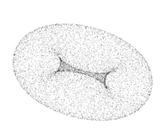Empathy is the prerequisite for compassion.
"I told you once that I was searching for the nature of evil. I think I’ve come close to defining it: a lack of empathy. It’s the one characteristic that connects all the defendants. A genuine incapacity to feel with their fellow man. Evil, I think, is the absence of empathy."
- G. M. Gilbert, American psychologist who worked on the Nuremberg trials.
Gilbert’s insight cuts sharply into the heart of what plagues modern society. Empathy isn't merely the ability to feel for others; it's the foundational bridge toward genuine compassion. Without empathy, compassion is impossible, as compassion is empathy made actionable. It’s the vital step that moves us from merely acknowledging someone else’s pain to actively doing something meaningful to alleviate it.
Today, however, the West has fundamentally lost touch with empathy the primitive to compassion. Driven by relentless individualism, consumerism, and an ever-growing disconnect from authentic community, we've gradually numbed our capacity to deeply understand the experiences of others. Social media, sensationalized media narratives, and echo chambers have eroded genuine human connection, replacing empathy with apathy, suspicion, and division. We scroll past tragedies without genuine pause, debate human rights issues as if they're abstract concepts, and increasingly engage in polarized discourse that further isolates us from real, compassionate dialogue.
The consequences of this are profound: Without empathy, our society is structurally incapable of compassion. Compassion requires more than mere intellectual acknowledgment of another’s suffering; it demands an emotional resonance that moves us into committed action. This resonance, this emotional connection, is precisely what we lose as empathy diminishes.
As our collective empathy fades, compassion itself becomes endangered, and we're left adrift in a society where suffering multiplies unchecked, conflict escalates, and trust erodes. We risk becoming indifferent observers of injustice rather than active participants in healing and reconciliation.
